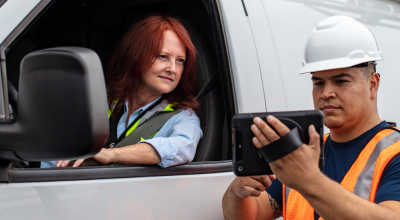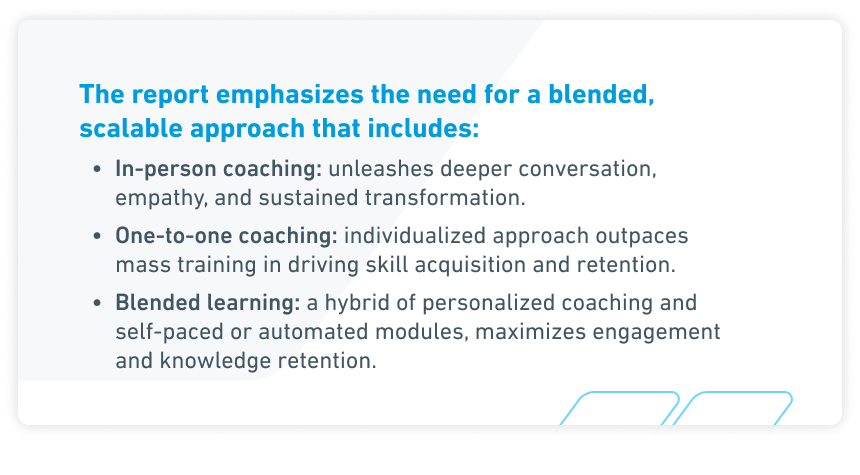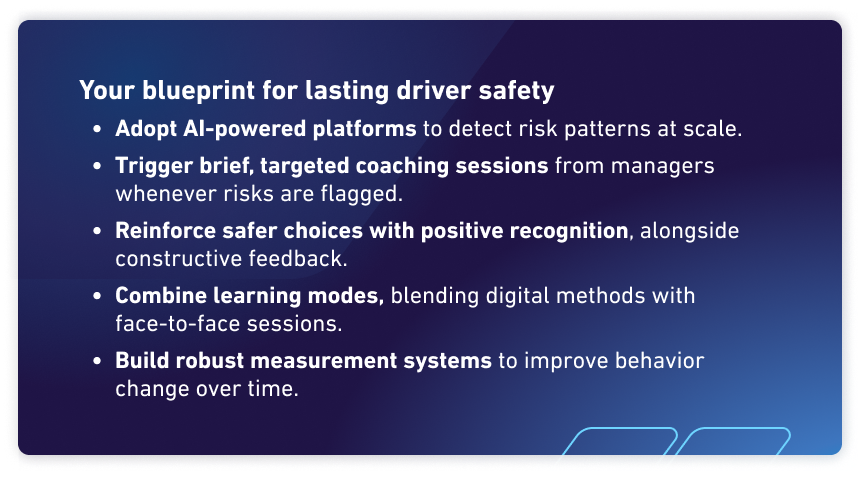Evidence-Based Insights: UC Study Affirms Lytx’s Blended Coaching Model

A new study from the University of California San Diego, “Evaluating and Optimizing Coaching Methodologies for Fleet Safety and Performance” (June 30, 2025), provides compelling evidence for Lytx®’s integrated, behavior-focused approach to driver safety.
The research weighs the pros and cons of three coaching methodologies: personalized, manager-led sessions; automated in-cab alerts; and self-guided coaching. Its findings validate Lytx’s unique blend of AI-driven detection and human-led intervention as the most effective, long-term solution for creating lasting behavior change.
What the study examined
The authors synthesized insights from education, behavioral science, and fleet operations to evaluate how these different coaching approaches impact driver behavior, safety, engagement, and organizational outcomes. They analyzed three key coaching techniques:
- Manager-led coaching
- In-cab automated alerts
- Self-directed or digital coaching tools
They assessed each method across dimensions like personalization, scalability, sustained behavior change, and resource requirements.
Core findings
Did you know that human behavior contributes to 93% of all motor vehicle collisions? This includes things like speeding, distracted driving, fatigue, or simply making a bad judgment call.
The need for proven, lasting coaching is clear. But what’s the best approach? The study explored different coaching frameworks and found the following:
.png)
- Manager-led coaching: Powerful but hard to scale
One-on-one sessions yield strong outcomes including increased engagement, intrinsic motivation, and long-term behavioral shifts. But the study notes a major barrier—access to qualified coaches is limited, especially across large fleets. - Automated in-cab alerts: Scalable but incomplete
These systems offer immediate feedback, scalability, and data-driven risk identification. However, without a human coach to interpret and reinforce learning, drivers fail to sustain safer habits over time. - Self-coaching tools: Flexible but often lack stickiness
Self-directed modules or app-based platforms empower drivers to explore at their own pace but tend to lack the accountability and engagement necessary for long-term behavior change.
It turns out that no single method reigns supreme. Each has clear strengths but also distinct weaknesses. Instead, the report emphasizes the need for a blended, scalable approach that includes:
.png)
- In-person coaching: unleashes deeper conversation, empathy, and sustained transformation.
- One-to-one coaching: individualized approach outpaces mass training in driving skill acquisition and retention.
- Blended learning: a hybrid of personalized coaching and self-paced or automated modules, maximizes engagement and knowledge retention.
Your blueprint for lasting driver safety
The study outlines a refined blueprint for optimizing driver safety programs:
.png)
- Adopt AI-powered platforms to detect risk patterns at scale.
- Trigger brief, targeted coaching sessions from managers whenever risks are flagged.
- Reinforce safer choices with positive recognition, alongside constructive feedback.
- Combine learning modes, blending digital methods with face-to-face sessions.
- Build robust measurement systems to improve behavior change over time.
This hybrid approach seeks to harness the efficiency of technology and the motivational depth of human interaction.
Why it matters for fleets like yours
The UCSD study recommends a safety model that integrates AI detection, real-time in-cab alerts, and data-informed coaching that is balanced with positive reinforcement:
.png)
- It confirms that tech-only fixes fall short. Without active manager engagement, behavior change doesn’t stick.
- It highlights the motivational value of personalized feedback and encouragement, not just point-based gamification.
- It highlights Lytx’s philosophy of balancing scale and personalization, using automation to focus human efforts where they matter most.
Effective solutions need to be smart
The UCSD study demonstrates that the most effective driver safety solution is not one-size-fits-all. It’s a smart integration: AI and alerts to detect and flag risk, augmented by timely, empathetic human coaching that fosters true behavior change. For fleets that demand measurable impact through safer travel, lowered risk, and protected drivers, it affirms: “Detect at scale. Humanize the fix.”
Ready to learn more about Lytx’s video safety approach and how it can help protect your people, equipment, and reputation? Explore how our industry-leading driver safety program is designed to help you improve driving habits, lower insurance claims costs, and increase fleet-wide safety.
